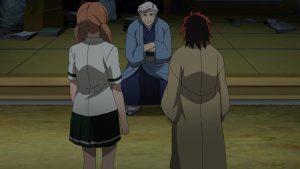 I can’t help but by impressed the consistently, solidity and sheer effectiveness of Hinomaru Zumou. The personality of the series perfectly matches that of the sport it depicts – there’s no flash or elegance to this show, it just plants both feet and pushes until the job is done (with the occasional slap, too). Rarely have I seen a sports anime so faithful to the tenets of the genre without feeling mundane because of that – perhaps my lack of familiarity with the ins and outs of sumo is acting a balance for the familiarity of the narrative itself.
I can’t help but by impressed the consistently, solidity and sheer effectiveness of Hinomaru Zumou. The personality of the series perfectly matches that of the sport it depicts – there’s no flash or elegance to this show, it just plants both feet and pushes until the job is done (with the occasional slap, too). Rarely have I seen a sports anime so faithful to the tenets of the genre without feeling mundane because of that – perhaps my lack of familiarity with the ins and outs of sumo is acting a balance for the familiarity of the narrative itself.
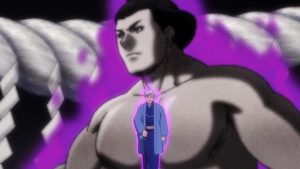 One thing that must be said is that more even than most traditional sports series, Hinomaru Zumou spends a lot of time immersed in training arcs. That makes varying the manner and scope of the training vitally important, and that’s in evidence with this Nagoya excursion. It certainly doesn’t hurt that Ogawa Tokio, the former Yokozuna who goes by Shunkai professionally, is played by arguably anime’s greatest chameleon in Inoue Kazuhiko. There are few – have ever been few – seiyuu who lose themselves in a character the way Inoue does. Shunkai strikes me as being quire close to Inoue’s “natural” persona, and he slips into the role of the old rikishi like a bespoke suit.
One thing that must be said is that more even than most traditional sports series, Hinomaru Zumou spends a lot of time immersed in training arcs. That makes varying the manner and scope of the training vitally important, and that’s in evidence with this Nagoya excursion. It certainly doesn’t hurt that Ogawa Tokio, the former Yokozuna who goes by Shunkai professionally, is played by arguably anime’s greatest chameleon in Inoue Kazuhiko. There are few – have ever been few – seiyuu who lose themselves in a character the way Inoue does. Shunkai strikes me as being quire close to Inoue’s “natural” persona, and he slips into the role of the old rikishi like a bespoke suit.
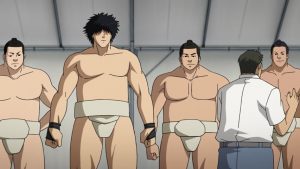 Shunkai is, as his reputation (and the custom of the genre) suggests, a stern and eccentric taskmaster. His initial assignments for Ushio (he insists Reina stick around too) are mostly household chores and seemingly impossible assignments to prepare various dishes with only a 100 Yen coin to buy ingredients. Eventually he does allow Ushio into the ring for a look at his Hundred Demon Throw, calling in of Shibakiyama’s stable to act as a sparring partner. The results are much the same as they were at the Shibakiyama training camp – once the larger opponent knows the move is coming, it’s ineffective.
Shunkai is, as his reputation (and the custom of the genre) suggests, a stern and eccentric taskmaster. His initial assignments for Ushio (he insists Reina stick around too) are mostly household chores and seemingly impossible assignments to prepare various dishes with only a 100 Yen coin to buy ingredients. Eventually he does allow Ushio into the ring for a look at his Hundred Demon Throw, calling in of Shibakiyama’s stable to act as a sparring partner. The results are much the same as they were at the Shibakiyama training camp – once the larger opponent knows the move is coming, it’s ineffective.
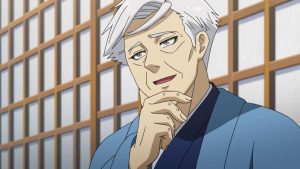 Fundamentally Hinomaru Zumou is, as so many of the classic sports stories are, an underdog tale. Shunkai is interested in Ushio mainly because of what he’s managed to do and what he’s trying to do despite his size. It’s human nature to root for people like him if one is a sports fan – as opposed to, say, last week’s “Odente”, Tenma Hikage (Hosoya Yoshimasa). There is, as Shunkai notes, a different sort of excitement in watching someone like him – an athlete possessed of enormous gifts and seemingly limitless potential who waltzes into Shunkai’s dojo and more or less demands to be taken on as a student. But which one is the average fan going to root for – and which one would be more fun to train?
Fundamentally Hinomaru Zumou is, as so many of the classic sports stories are, an underdog tale. Shunkai is interested in Ushio mainly because of what he’s managed to do and what he’s trying to do despite his size. It’s human nature to root for people like him if one is a sports fan – as opposed to, say, last week’s “Odente”, Tenma Hikage (Hosoya Yoshimasa). There is, as Shunkai notes, a different sort of excitement in watching someone like him – an athlete possessed of enormous gifts and seemingly limitless potential who waltzes into Shunkai’s dojo and more or less demands to be taken on as a student. But which one is the average fan going to root for – and which one would be more fun to train?
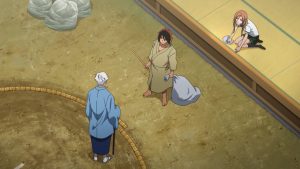 Ushio is as perfect a fit for Hinomaru Zumou as sumo is. For a series that relies on tradition and solidity, what story could be more compelling that his? Even Reina is getting swept along by the magnitude of what Ushio (is it me or has he seriously bulked up over the new year break?) is trying to do and his continues success at pursuing it (and maybe by something else, too). He has none of the sense of entitlement that Mikage (who looks down on his older brother, who is an Ozeki – the #2 ranked sumo – because he hasn’t made Yokozuna) does. Everything Ushio does he’s fully aware he has to earn – so it’s only right that Shunkai relents and allows him to accept Mikage’s challenge.
Ushio is as perfect a fit for Hinomaru Zumou as sumo is. For a series that relies on tradition and solidity, what story could be more compelling that his? Even Reina is getting swept along by the magnitude of what Ushio (is it me or has he seriously bulked up over the new year break?) is trying to do and his continues success at pursuing it (and maybe by something else, too). He has none of the sense of entitlement that Mikage (who looks down on his older brother, who is an Ozeki – the #2 ranked sumo – because he hasn’t made Yokozuna) does. Everything Ushio does he’s fully aware he has to earn – so it’s only right that Shunkai relents and allows him to accept Mikage’s challenge.
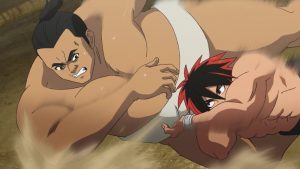 Sure, there’s something very old-hat about Shunkai’s reasoning behind his methods, and even about Ushio’s eventual solution to the riddles before him. But I love the central conceit here – that Ushio considers himself blessed because of all the help he’s received, even as old warhorses like Shunkai and Shibakiyama (I think we can now confirm he was the one who called in Shunkai) focus on the bum hand life has dealt Ushio in many ways. If you’re going to succeed in telling a traditional story in a traditional way, you have to make sure the components are top-quality – and with Hinomaru Zumou, that’s definitely the case.
Sure, there’s something very old-hat about Shunkai’s reasoning behind his methods, and even about Ushio’s eventual solution to the riddles before him. But I love the central conceit here – that Ushio considers himself blessed because of all the help he’s received, even as old warhorses like Shunkai and Shibakiyama (I think we can now confirm he was the one who called in Shunkai) focus on the bum hand life has dealt Ushio in many ways. If you’re going to succeed in telling a traditional story in a traditional way, you have to make sure the components are top-quality – and with Hinomaru Zumou, that’s definitely the case.


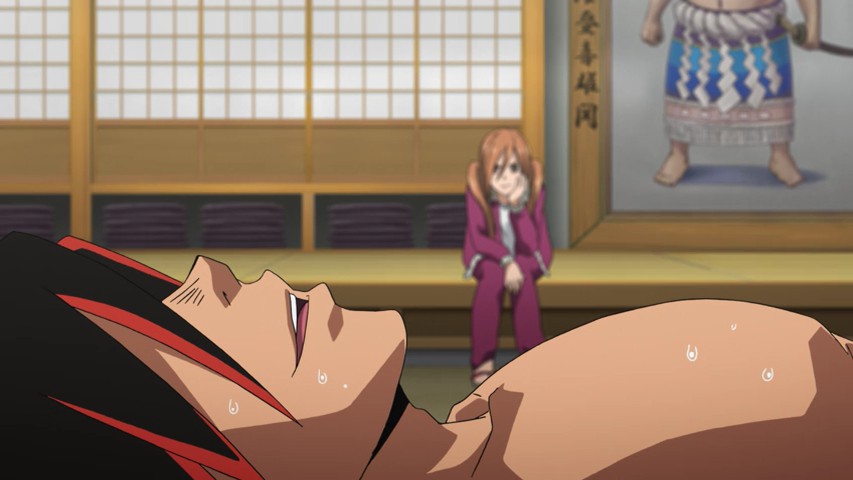
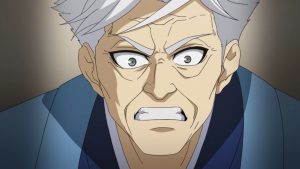
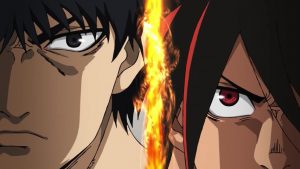
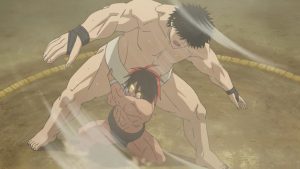
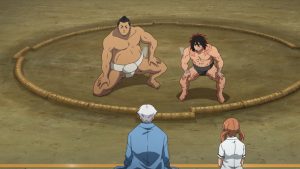
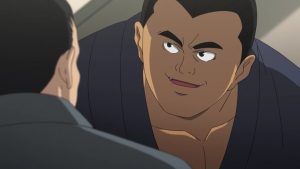
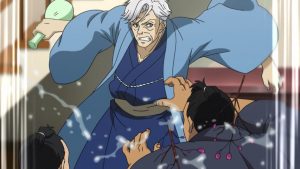
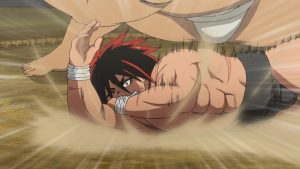
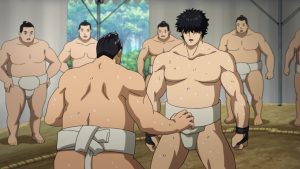
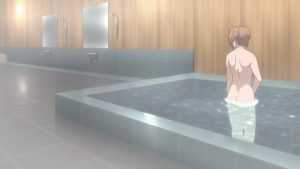
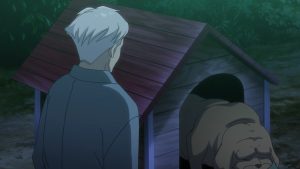
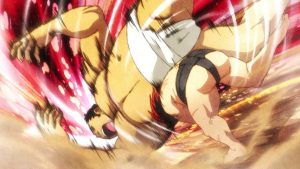
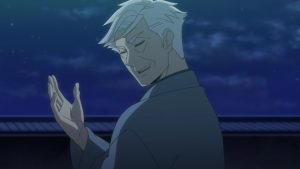
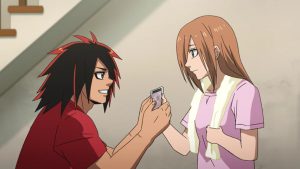
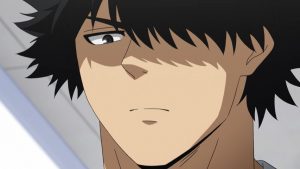
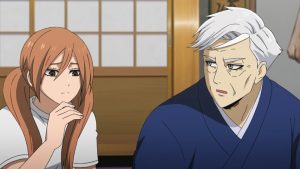
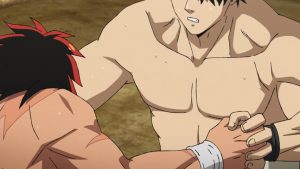
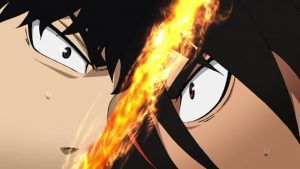
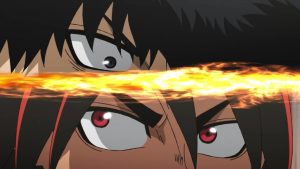
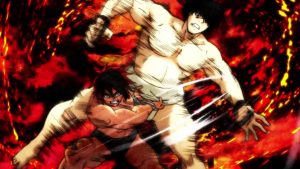
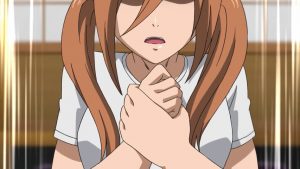
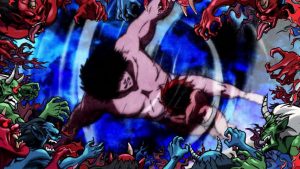
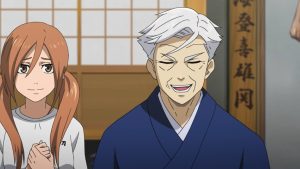
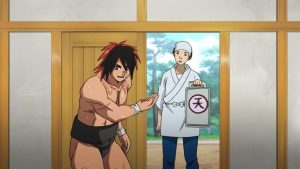
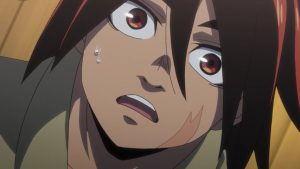
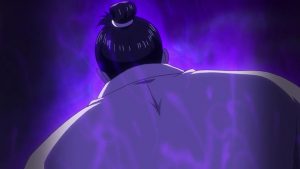
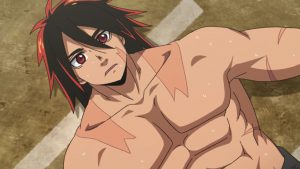
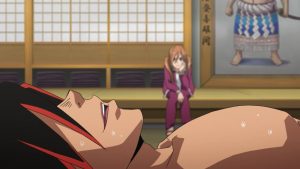
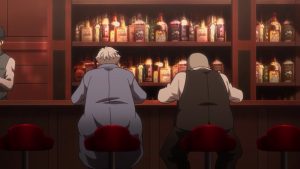
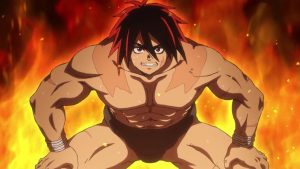
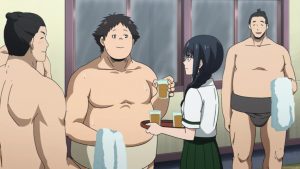

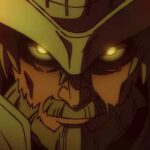
Nadavu
January 16, 2019 at 7:08 amThis may have been my favorite episode of HnZ to date. The pacing was great (special training culminates in big fight and reward in just a single episode, who’dda thunk it?), but even more importantly, Reina went from being a single dimensional character to someone who might one day be considered three dimensional, and the old shisho showed he has real heart.
In a way, the fact that the dynamics worked so well in this episode is worrying, because It means there’s something misfiring when the whole sumo club is together. We have six young warriors (including Kirihito), and less than half of that in dimensions between them. I think this episode showed me what character development is affected not just by the obvious tradeoff with training/competing, but that it is also affected by the number of characters in the spotlight.
Guardian Enzo
January 16, 2019 at 7:43 amI think it’s effected by the pacing too. This series isn’t some commercial powerhouse – once the two cours are done that’s probably it.